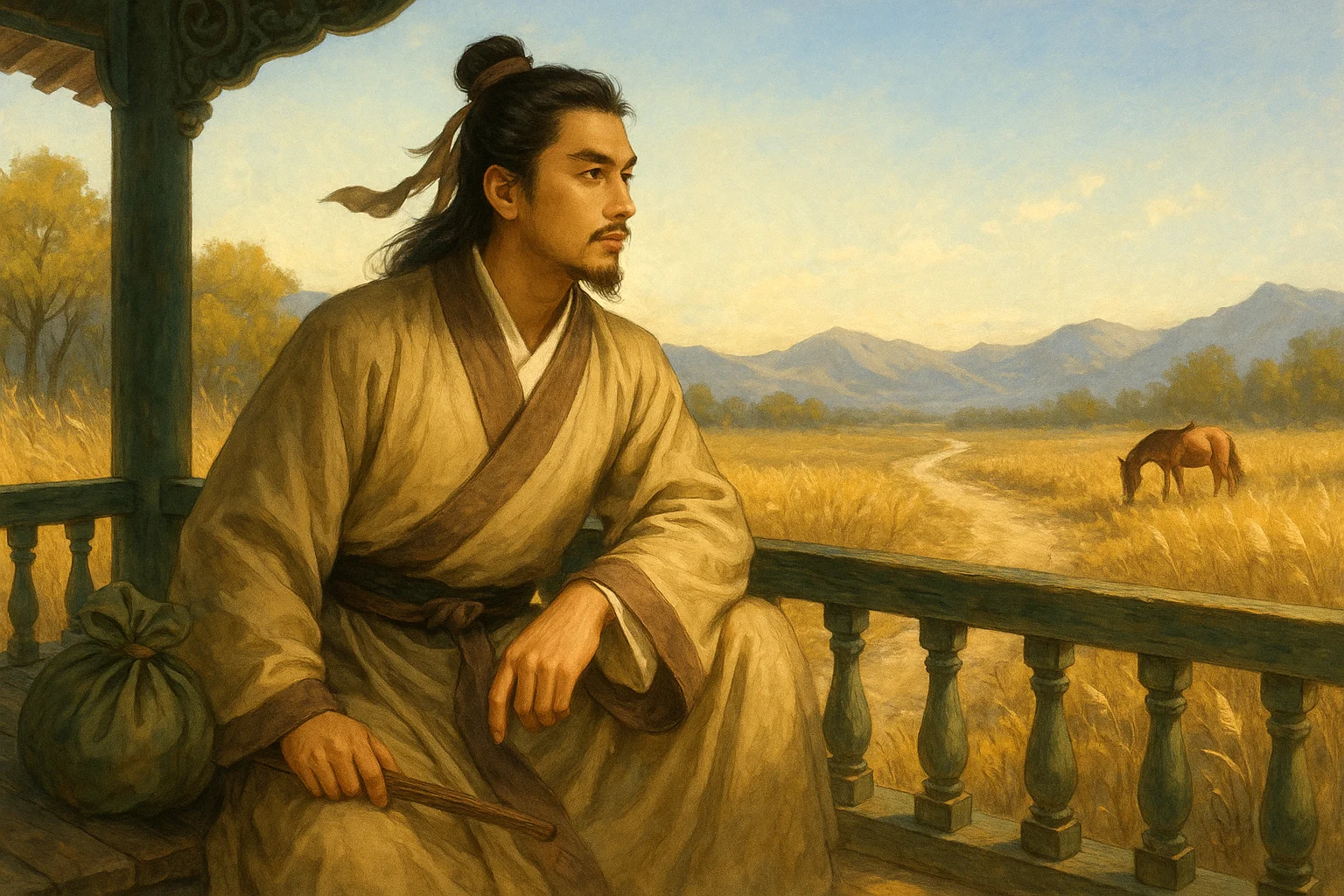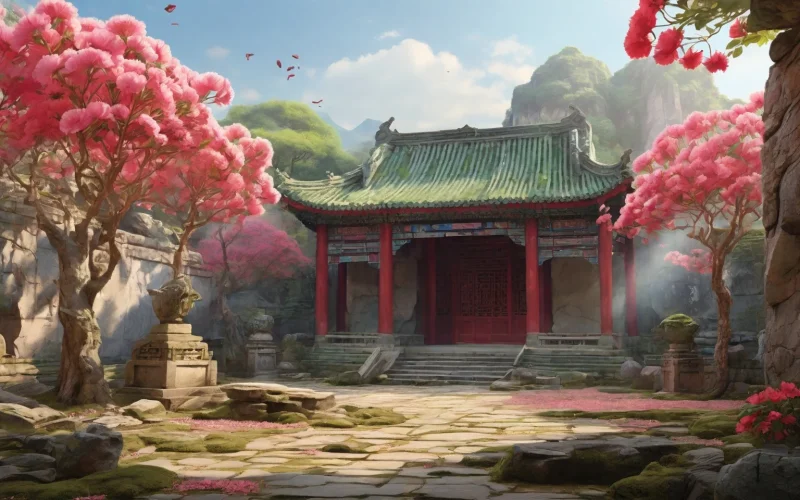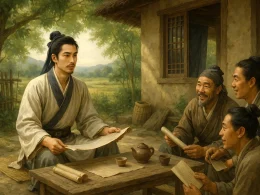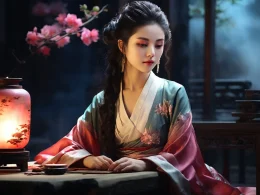By azure maples, river gleams at dusk,
A Chu exile grieves spring alone—
We face this cup of wine,
Two men bound for worlds unknown.
Suspicion made you banished,
Yet your integrity stands tall.
Fear not the southern heat too long,
New rains renew the land through all.
Original Poem
「送郑明府贬岭南」
司空曙
青枫江色晚,楚客独伤春。
共对一尊酒,相看万里人。
猜嫌成谪宦,正直不防身。
莫畏炎方久,年年雨露新。
Interpretation
This poem was composed by Sikong Shu to bid farewell to Zheng Mingfu, a Tang official exiled to Lingnan (modern Guangdong) after offending powerful courtiers with his candid speech. Historically a place of banishment, Lingnan's remote location and oppressive climate made it a feared destination. Through this parting verse, the poet expresses solidarity, compassion, and encouragement—blending sorrow for separation with admiration for Zheng's integrity and hope for his future. The work radiates sincere friendship and intellectual camaraderie, embodying the noble ethos of Tang scholar-officials.
First Couplet: “青枫江色晚,楚客独伤春。”
Qīng fēng jiāng sè wǎn, Chǔ kè dú shāng chūn.
River reflects maples in twilight hues, / A Chu exile mourns spring alone.
The opening merges scene and sentiment: "maples and river twilight" paint a melancholic backdrop, while "Chu exile" (楚客)—a classical allusion to banished souls—subtly dignifies Zheng's plight. "Mourns spring" (伤春) laments both seasonal decay and the injustice of exile, layering personal and cosmic sorrow.
Second Couplet: “共对一尊酒,相看万里人。”
Gòng duì yī zūn jiǔ, xiāng kàn wàn lǐ rén.
We face this shared cup of parting wine, / Gazing at one already miles away.
This poignant moment captures farewell's paradox: physically present yet psychically distant. The "shared cup" symbolizes enduring bonds, while "gazing at one already miles away" crystallizes the anticipatory grief of separation—a testament to profound friendship beyond words.
Third Couplet: “猜嫌成谪宦,正直不防身。”
Cāi xián chéng zhé huàn, zhèngzhí bù fáng shēn.
Suspicion cast you into exile, / Your integrity wore no armor.
With restrained indignation, the couplet diagnoses Zheng's misfortune: victimized by court intrigues precisely because of his unguarded uprightness. The metaphorical "no armor" (不防身) elevates Zheng's moral courage while indicting political toxicity—a quiet but powerful protest.
Fourth Couplet: “莫畏炎方久,年年雨露新。”
Mò wèi yán fāng jiǔ, nián nián yǔ lù xīn.
Fear not Lingnan's enduring heat— / Rain and dew renew each year.
The closing transforms consolation into a vision of resilience. "Rain and dew renew" (雨露新) operates doubly: as natural assurance of Lingnan's fertility, and as political metaphor for imperial favor's potential return. This hopeful ambiguity encourages Zheng to perceive exile not as an end, but as a cyclical pause before renewal.
Holistic Appreciation
The poem carries a somber yet not sorrowful tone, with restrained language that conveys profound sincerity. The poet begins with an evening scene, blending in the sentiment of "grieving for spring" to outline the lonely atmosphere of a riverside farewell. He then depicts the shared wine and reluctant parting between two friends, before calmly revealing the reason for his companion's exile—a plainspoken tone that nonetheless reveals deep sympathy. The poem concludes with "fresh rain and dew," offering both comfort and hope, expressing optimistic anticipation for a turn in fate. Tightly structured and naturally progressive in emotion, it ends with gentle yet powerful resonance, standing as a uniquely moving farewell piece.
Artistic Merits
- Scene and Emotion Intertwined, Feeling Through Scenery: The opening lines use "blue maples by the river" to paint twilight, drawing out emotion through landscape and creating a profound mood.
- Concise Imagery, Far-reaching Sentiment: Phrases like "wanderer from Chu" and "grieving for spring" are classical yet natural, echoing history while remaining timely—meaning extends beyond words.
- Steady Diction, Restrained Feeling: The poet avoids melodrama or explicit bitterness, yet everywhere implies compassion and reluctance, embodying the dignified ethos of Tang scholar-officials.
Insights
This poem teaches us that upright individuals, though easily sidelined, are most worthy of respect. Facing life’s demotions and turns, one should maintain composure and hold fast to principles. The care and trust of friends become invaluable strength in adversity. The warmth and camaraderie Sikong Shu embodies in these verses still offer comfort and inspiration today.
About the poet

Sikong Shu (司空曙), c. 720 – c. 790, courtesy name Wenming, was a native of Guangping (present-day Yongnian County, Hebei Province). A renowned mid-Tang dynasty poet, he was one of the "Ten Literary Masters of the Dali Era," alongside Lu Lun, Qian Qi, Han Hong, Li Duan, and others. Though his life lacked illustrious achievements, his poetry—marked by genuine emotion in simplicity and profound contemplation in solitude—secured him a unique place in mid-Tang literary circles.












